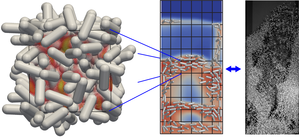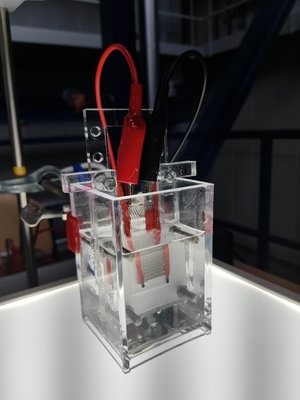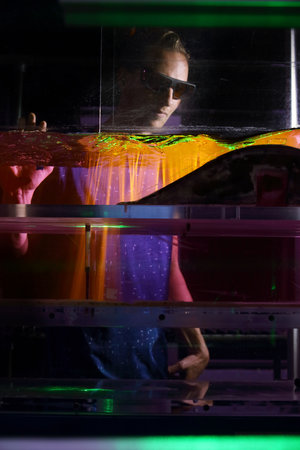MSc programme
EFPT students can tailor their degree to emphasize energy engineering, process engineering, or fluid mechanics.
-
EFPT students who focus on process technology learn to define, design and optimize the processes and equipment that transform raw goods into consumer products.
Nowadays Process Technology faces tremendous challenges related to the shrinking availability of non-renewable resources, rising energy prices, and a broad spectrum of environmental and safety issues. These challenges affect numerous industries, including oil and gas, food, pharmaceutical and bulk industries. The Process Technology of the future must get more while using less. That requires the re-invention of industrial processes to develop sustainable processes that use energy and resources more efficiently while drastically reducing waste streams – or even reuse waste as new primary material resources.
Students within EFPT specializing in Process Technology receive the knowledge and skills they need to systematically define, design and optimize a variety of sustainable processes and equipment. Students learn the state-of-the-art in process intensification, thermodynamics, fluid dynamics and process control. They get hands-on experience in sustainable process technology within their graduation project at one of the sections of the Process & Energy Department.

Modelling particle and bubble movement in a fluidized bed on various scales -
Energy is the vital force powering business, manufacturing and the transportation of goods and services to serve the world economies. Demand for energy is growing, while the related environmental impact of pollutants from energy conversion processes is one of the major problems facing humanity. One of the fundamental challenges for the future is the sustainable production of energy, with gradual emancipation from fossil fuels due to their increasing scarcity and associated political danger. This can only be achieved by technological improvement and innovation.
EFPT students who focus on energy technologies develop a thorough understanding of energy conversion and utilization. Students learn about state-of-the-art analysis tools and apply them to study highly efficient, environmentally friendly and integrated processes for the production and utilization of heat, power and secondary fuels like hydrogen. Starting at a systems analysis level, students gain skills to apply their knowledge in sustainable next-generation processes.
The research activities focus on both systems and components. The system-related studies aim at optimizing the complete chain of energy production and utilization, the thermodynamic design of processes and their integration into larger systems and online optimization using modern diagnostic tools. Examples include advanced biomass utilization concepts such as gasification in combination with fuel cells, gas or ORC turbines and hydrogen production. Component-level research is related to combustion, co-combustion and gasification in fluidized bed and/or pulverized fuel systems and the combustion of LCV gases in gas turbines.

-
EFPT students who focus on fluid mechanics receive training in the fundamentals of fluid flow. Particular attention is paid to turbulence and multi-phase flow, since these are relevant to many industrial and environmental applications. Much emphasis is placed on computational fluid dynamics (CFD) and its use in solving various practical problems.
Associated research activities at the Fluid Mechanics Group at TU Delft concern the application of numerical tools to fluid mechanics, particularly with respect to the simulation of turbulence. In fluid mechanics we cannot do without experiments. For this reason, most of the numerical work is combined with experimental research emphasizing the use of new measurement techniques. Consequently, the student is trained in all aspects of modern fluid mechanics in both classroom and research environments.

Programme - in detail
Course requirements for the first year of the EFPT track are divided in several categories. The first is a group of three courses (12 ECTS total) of the core Mechanical Engineering Master at TU Delft:
- Advanced Fluid Dynamics (4 ECTS)
- Advanced Heat Transfer (5 ECTS)
- Measurement Technology (3 ECTS)
The second category (10 ECTS total) comprises EFPT specific compulsory courses:
- Advanced Applied Thermodynamics (5 ECTS)
- Equipment for Heat and Mass Transfer (5 ECTS)
These courses train the student in key basic disciplines such as fluid dynamics, thermodynamics, process modeling and simulation, and process equipment design.
In the third category (10 ECTS total), students begin to tailor their degree program by selecting two courses from a list of four:
- Process & Power Plant Design (4 ECTS)
- Computational Fluid Dynamics for Engineers (5 ECTS)
- Separation Technology for Renewable Processes (5 ECTS)
- Turbulence (5 ECTS)
A fourth category strengthens the Mechanical Engineering skills of the student. At least 2 courses should be selected from the following list of eight:
- Physics for Mechanical Engineers (4 ECTS)
- Nonlinear Mechanics (4 ECTS)
- Multibody Dynamics B (4 ECTS)
- Control Systems Design (5 ECTS)
- Intelligent Vehicles (5 ECTS)
- Drive & Energy Systems (3 ECTS)
- Mechatronic Systems Design (4 ECTS)
- Engineering Dynamics (4 ECTS)
A fifth category puts the engineering skills into a broader societal context; a non-technical course of 3-6 ECTS must be chosen. Often these courses are related to climate, ethics, starting a company, etc.
Finally there is a sixth category (filling ECTS of the program up to at least 60) containing a long list of technical electives, examples of which are given below. Other choices from the full TU Delft course catalog are also possible (as long as they are technical courses), in consultation with the EFPT Master’s Coordinator.
- Electrochemical Energy Storage
- Modelling Electrolyzers, Fuel Cells, and Batteries
- Rheology of Complex Fluids
- Particle-based modeling of fluids
- Experimental Techniques in Fluid Mechanics
- Microfluidics: Applied theory and lab
- Multiphysics Transport in Energy Materials
- Buildings as Energy and Indoor Climate Systems
- Turbomachinery
- Introduction to Multiphase Flow
- Refrigeration and Heat Pumps Fundamentals
- Process Dynamics & Control
- Multiphase Reactor Engineering
- Fluid-Structure Interaction
- Gas Dynamics
- Molecular Thermodynamics
- Computational Materials Science
- Thermochemistry Biomass Conversion
- Nonlinear Differential Equations
- Numerical Analysis
- Gas Turbine Simulation/Application
Second year students in the EFPT track complete and industrial internship (15 ECTS) and a research project (35 ECTS) under the supervision of a TU Delft researcher.
Internships can be completed in the Netherlands and abroad.
Recent graduation research project topics include:
- Responsive microgel-based inks for inkjet printing: Application for in-situ sensing on-a-chip
- Characterisation of electrochemical properties of capacitive membrane electrodes
- Development and Validation of a Physics Based Modeling Framework for Batteries
- Dynamics of particles on the turbulent free surface
- Carbon material circularity: processing methods to recover graphite from spent Lithium-ion batteries
- Effects of hydrogen bubbles on the performance of an LOHC dehydrogenation reactor
- Effect of buoyancy on the laminar boundary layer in a stably/unstably stratified flow of supercritical carbon dioxide
- Blue Hydrogen in a flexible multicommodity energy system
- Heat Transport In Capillary-Fed Electrolysis